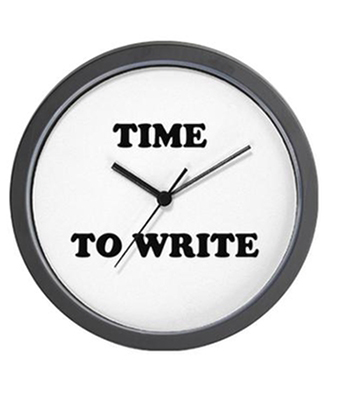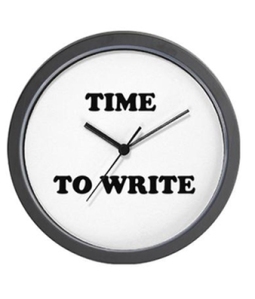
Time to Write
 Today’s writers contend with distractions inconceivable to writers of the past. It has almost become pat to discuss the diversions inherent in living in our modern, digitally connected world. But these problems of instant gratification and endless attention shifting are even more lethal to the creative than they are to the average citizen.
Today’s writers contend with distractions inconceivable to writers of the past. It has almost become pat to discuss the diversions inherent in living in our modern, digitally connected world. But these problems of instant gratification and endless attention shifting are even more lethal to the creative than they are to the average citizen.
The writing process requires a lot of space and silence, though that isn’t always immediately apparent. Writers are urged to read–read often and read the greats–and this is good advice. An hour with The Plague will certainly serve your craft better than an hour of watching cat videos. (No offense–I’m a total cat person!) But even carefully curating our information diets is not enough to protect our writing life.
Writers must also push back against over-scheduling and the pervasive, toxic level of busyness lauded by our society. If not, our minds and hearts will not have the resources to amalgamate whole worlds, or drink in new images, or index precise vocabulary for later use.
And not only is our culture generally hostile to the kind of deep reflection necessary for writing, it literally devalues creative endeavors–after all, writing is a gainful career for only a fraction of pursuants. So you can see the kind of conviction necessary to create a regular writing practice.
So how does a novelist stay focused on such an enduring project?
Like anything else, the desire to write must be a powerful one if the writer is to stay on task. I joke often that I only write because I can’t not-write. Not writing makes me cranky, to use a very scientific term. There is a kind of creative constipation that sets in any time I step away from the page for more than a couple of days. The mental hurdle to starting again grows in proportion to the time spent away. Eventually, I find myself sitting in front of my computer screen, hopeless that I will ever regain the ease of my own voice. (It does come back, if only after painful hours of working through the stock sentences and lame ideas that have built up inside my mental pipes. There is no shortcut for this, unfortunately.)
Even with this knowledge, I still go through periods of falling away from my daily writing practice. Sometimes I self-sabotage a project that is nearly completed. Sometimes I just allow the overgrowth of my life to cover and consume the time I’ve allotted for writing. Sometimes, through no fault of my own, my writing time gets eclipsed by other, more immediate needs.
In these times, when I feel the need to reset the boundaries of my writing life and reinstate the inner guard who takes my writing seriously, it is helpful for me to remember the advice to “do your own work first.” For me that means that I will answer emails in the afternoon, but I will write in the morning. I will read articles and books at night, but I will write in the morning. I will critique for my writing partners on schedule, but I will write my daily allotment of my own manuscript first.
The writing simply has to matter more than the other stuff. No one can give you that determination or discipline. You must earn it through careful observation of yourself when you are not writing, and truthful examination of all the pieces of your life and what purpose they serve. Use a felt sense of your own mortality for a scale. After all, the ultimate deadline will befall each of us eventually.
I’ll leave you with one of my favorite quotes about writing, from the late Zen Buddhist teacher and author, Alan Watts:
“Advice? I don’t have advice. Stop aspiring and start writing. If you’re writing, you’re a writer. Write like you’re a goddamn death row inmate and the governor is out of the country and there’s no chance for a pardon. Write like you’re clinging to the edge of a cliff, white knuckles, on your last breath, and you’ve got just one last thing to say, like you’re a bird flying over us and you can see everything, and please, for God’s sake, tell us something that will save us from ourselves. Take a deep breath and tell us your deepest, darkest secret, so we can wipe our brow and know that we’re not alone. Write like you have a message from the king. Or don’t. Who knows, maybe you’re one of the lucky ones who doesn’t have to.”
Your writing matters. How do you make time for it?